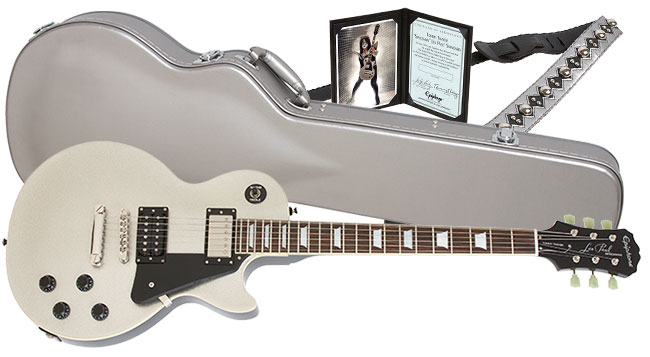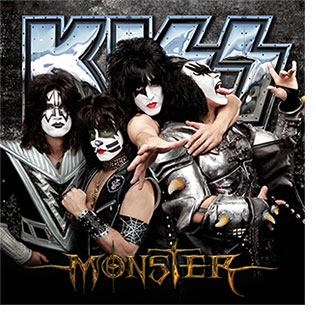There has never been an American rock and roll band like KISS, recognized around the world for their hard-rockin’ and spectacular stage show. Over the last decade, while many of their colleagues have struggled to keep an audience, KISS has enjoyed a renaissance with sold out tours around the world, great record reviews, and a renewed spirit.
 Much of that can be attributed to lead guitarist Tommy Thayer. Thayer had been a behind-the-scenes member of the KISS family since 1985 working as a songwriter, guitarist, and even a video producer. But in 2002, Thayer joined KISS full time as the legendary “Spaceman,” giving the rock legends an explosive new sound and attitude. Now, Epiphone is proud to present the Ltd. Ed. Tommy Thayer “Spaceman” Les Paul Standard Outfit, a beautiful Les Paul Standard in a one-of-a-kind Silver Flake color finish that’s worthy of KISS’s 21st century “Spaceman.” Epiphone spoke with Thayer about his Les Paul, joining KISS, and his first trip to Hollywood in the early ’80s.
Much of that can be attributed to lead guitarist Tommy Thayer. Thayer had been a behind-the-scenes member of the KISS family since 1985 working as a songwriter, guitarist, and even a video producer. But in 2002, Thayer joined KISS full time as the legendary “Spaceman,” giving the rock legends an explosive new sound and attitude. Now, Epiphone is proud to present the Ltd. Ed. Tommy Thayer “Spaceman” Les Paul Standard Outfit, a beautiful Les Paul Standard in a one-of-a-kind Silver Flake color finish that’s worthy of KISS’s 21st century “Spaceman.” Epiphone spoke with Thayer about his Les Paul, joining KISS, and his first trip to Hollywood in the early ’80s.
Tommy, thanks for speaking with us and congrats on your Ltd. Ed. Tommy Thayer “Spaceman” Les Paul Standard. Epiphone fans have been very excited about this guitar. What when through your mind when you realized that you could design your own guitar?
I’ve always been a traditionalist when it comes to amps, guitars and gear in general. When the opportunity came up for an Epiphone Tommy Thayer signature guitar, the first thing I thought of was offering a pro guitar for musicians that looks amazing and is also affordable. I wanted it to be the guitar I play onstage with KISS but also a classic looking instrument that would catch the eye of any player.
You grew up in Beaverton, Oregon which some might not consider the best place to see a lot of live rock n’ roll.
To the contrary, Beaverton is a suburb to Portland, Oregon where I saw tons of great rock shows at the Paramount Theatre and the Memorial Coliseum through the 1970s and early 80s. I went and saw literally every rock band that came to town. At the Coliseum you could walk around the top section of seats that went behind the stage. Before the show started, I was fascinated looking down at the amps, guitars and gear the bands were using. I dreamed of someday owning a stack of amps or a Les Paul guitar. I used to hang out at the local guitar shops in Beaverton or Portland and stare at the guitars on the wall, dreaming about owning one. I never would have imagined that one day I would have my own Epiphone Tommy Thayer Signature Les Paul!
Tell us about the signature model: what were you looking to do with this model that you’ve never seen before?
I’m proud of the Epiphone Tommy Thayer “Spaceman” Les Paul Standard. It’s modeled exactly like my silver sparkle top Gibson Custom Shop LP Standard I’ve played onstage for years with KISS. People don’t realize it, but I wanted my first signature guitar to be an Epiphone. It’s a quality-constructed instrument utilizing the same parts I use on all my Les Pauls, including Gibson 498 pick-ups and Grover™ Deluxe tuners. It’s a truly professional guitar for real musicians but available at a price that’s afford able for everyone. The guitar comes in a custom silver hard-shell case together with a very cool studded black and silver leather guitar strap just like the ones I use. I’m playing my Epiphone signature model onstage with KISS now and I couldn’t be happier with the sound, the look and the performance of the guitar, it’s outstanding!
Tell us about how you got started in the business. What inspired your move to Southern California? That’s a brave move for a kid from Oregon.
That was back in the Black ‘N Blue days. I actually wasn’t so brave. I knew that our future was in LA but I hesitated at first. Our singer and my best friend Jaime persuaded me to move and it’s a life-changing decision that I still thank him for. When we arrived in Hollywood (in 1983) we tore it up because we were a hot band with great songs and a presence. John Kalodner from Geffen Records saw it, snapped us up and signed the band after just a few months in town. Soon, we were on our way to Germany to record our first album. The Hollywood rock scene was exploding then. Every night the streets were packed with hard rock kids and hot chicks. It was a great time for us and for our music.
A lot of KISS fans may not know that you’ve been part of the KISS family since the early ’80s as a writing, singer, and aide-de-camp. How did you first meet Gene Simmons?
Fast forward about two years. As a struggling up and coming band, we had just released our second album and somehow we landed the opening slot on the KISS Asylum tour. That’s when I got to know Gene, Paul, Bruce, and Eric Carr. They knew we were fans and they took interest and gave us some help, especially Gene. He was interested in producing bands and eventually began working with us producing our third and fourth albums. Things evolved and soon I began working for KISS first behind the scenes, then later directly with the band, and then ascended to the coveted KISS lead guitar spot in 2002.
Was working with KISS a dream-come-true right away or did you still want to pursue a career with Black ‘N Blue?
Actually, being the lead guitarist in KISS was unimaginable, but I think Paul and Gene had almost made me the heir apparent for several years before it happened. Because of the volatility in the band from 1998 on, I was literally on ‘stand-by’ backstage for several tours to take over on guitar if necessary. Behind the scenes, I had my own KISS outfit, boots and makeup kit in case of an emergency situation. By the time they asked me to be the new KISS lead guitarist over 10 years ago, the writing had been on the wall for a long while.
When you took over as the Spaceman, how did that change KISS musically?
Very slowly at first. With 30 years of KISStory preceding me in the band, you needed to be faithful and support where the band had come from and what made it so powerful in the first place. It wasn’t the time to reinvent the wheel with a new style of guitar playing or a new character or personality.
It seems like KISS has been on a steady upswing since you joined the band.
Over the course of the last 10 or 11 years KISS has slowly built to new heights. The success of our tours, particularly since 2008, have been astounding. Going back into the studio in 2009 to record Sonic Boom and then again with Monster this year has been an incredible growing experience. With the support and encouragement of Paul, Gene, and Eric I’ve been able to take my guitar playing to a whole other level. It’s a great feeling.
 How did you go about recording Monster in the studio? A lot of bands today–after years of doing things piecemeal–are going back to “performing” in the studio. Does KISS still enjoy the studio?
How did you go about recording Monster in the studio? A lot of bands today–after years of doing things piecemeal–are going back to “performing” in the studio. Does KISS still enjoy the studio?
The thing that has inspired us most to record is the music — new, great, rootsy, hard rock songs. If you think about it, there aren’t really many bands making an album like Monster anymore. The other part of it in all honesty, is there aren’t many bands that can record like this anymore either. We record sitting in a studio together with our guitars, our amps and our drums. Eric counts the song off and we record to tape. We do two or three takes of a song and we’re done.
You’ve been part of their process of rehearsing for an album for a long time. What’s changed over the years?
The style and approach of making KISS records has changed over the years that I’ve been around. In fairness, the ’80s were a different time. Good or bad, radio and MTV played a huge role influencing the direction of how material was written, recorded and produced. Since the ’80s I think the best KISS records have been the ones made with a strong producer presence who really understands what makes a great KISS record. Bob Ezrin with Revenge and Paul Stanley with Sonic Boom and Monster come to mind immediately. Paul pushed for an honest and back to basics approach with Sonic Boom and Monster. I liken it to a new young band, writing, arranging, and recording great rock songs without personal agendas or the compromising influence of record labels, radio and outside songwriters.
For young players who can’t work with the wattage that you do on stage, what tips do you have for getting the tone of some of KISS’s classic songs out of a small amp?
You don’t need a big amp to get a great tone. The reason we use so much power and wattage onstage is to be heard! Hughes & Kettner makes my signature Tommy Thayer Duotone amplifier. It has a beautiful tone AND it’s powerful and loud. HK has recently had success with a new amp called the TubeMeister. It’s essentially a smaller, affordable version of my signature amp, but with the same great tone.
What’s next for 2013? I know you’ve done a lot of work to get instruments and music lessons into schools and community groups back in Oregon. Are there any events/programs you’d like our fans to know about?
The most exciting thing happening is the January 2013 worldwide release of the Tommy Thayer Epiphone signature ‘Spaceman’ Les Paul, coming to a music store near you. And just as exciting is the KISS Monster world tour that continues in Australia in February/March and onto Europe in May/June. Other 2013 KISS dates will be announced in the months ahead. For more updated info check outwww.tommythayer.com and Twitter @tommy_thayer. See you on the road!
